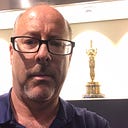Member-only story
A Writer’s Flashback: My 2005 Interview with Laurell K. Hamilton
Widely known as among the most influential of all writers of paranormal fiction, Laurell was gracious and open with my questions.
“You are what you say you are. I was a writer long before I sold the first short story.” — Laurell K. Hamilton
I interviewed author Laurell K. Hamilton in 2005, over email, for a motivational non-fiction book, “How to Survive a Day Job.” My intent with the book was simple: I would interview a number of successful writers, actors, and others who have worked in a given creative arts field, to motivate those of us who had not yet attained our own artistic career goals.
At the time of her interview, Laurell was the author of two best-selling series that combine mystery, fantasy, magic, horror, and romance. Her “Vampire Hunter” novels from Ace Books, featuring necromancer and crime investigator Anita Blake, and her Merry Gentry novels from Ballantine continued to set sales records. She lived in St. Louis County, Missouri, with her husband, daughter, two pugs, two part-pug dogs, and an ever-fluctuating number of fish.
For updated information on Laurell K. Hamilton, you can visit her website, http://www.laurellkhamilton.com, or her Wikipedia page…
